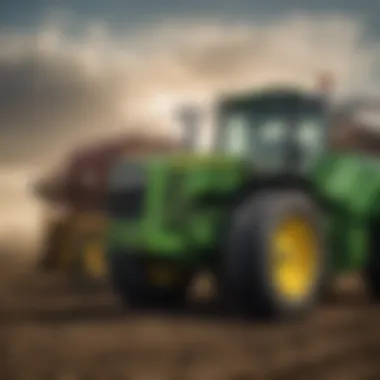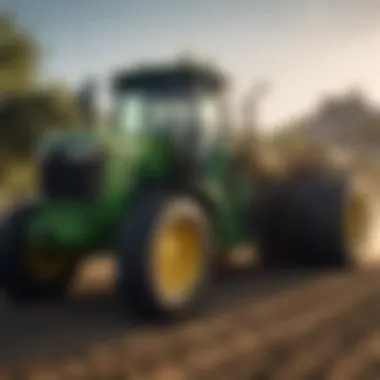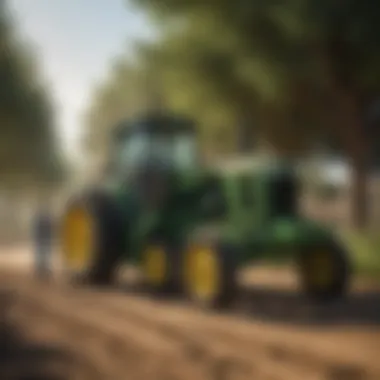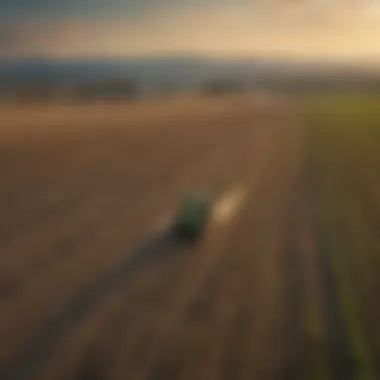The Role of John Deere in Madera's Agriculture


Intro
In the heart of California's Central Valley, Madera represents a unique blend of agriculture and technology. Farmers in this region face various challenges, from fluctuating market conditions to climate change impacts. Among the solutions that have emerged, John Deere is a notable player. This article explores how John Deere's agricultural machinery and services influence the farming landscape in Madera.
Through the integration of advanced equipment and a commitment to sustainable practices, John Deere is reshaping local farming. Understanding this influence is essential for farmers, agricultural enthusiasts, and anyone interested in the evolving trends in farming practices.
Madera relies heavily on agriculture. The region grows a variety of crops, from almonds to grapes. The adoption of efficient farming equipment is critical to enhance productivity and ensure sustainability. Farmers need reliable machinery that can withstand the local conditions while being adaptable to emerging agricultural challenges.
John Deere not only supplies equipment but also focuses on developing technology that meets farmers' specific needs. As we delve into this topic, we will examine trends, innovations, and practical applications related to John Deere's presence in Madera.
Preamble to John Deere
The introduction of John Deere into the agricultural machinery landscape is a key theme in understanding its importance, particularly for farmers in Madera, California. This section contextualizes John Deere's presence in the area, serving as a cornerstone for future discussions in this article.
John Deere has long been synonymous with farming innovation. The company offers an extensive range of machinery that enhances productivity and efficiency in various farming operations. Understanding the roots of this brand and its core values allows for a deeper appreciation of the influence it wields on local agriculture.
By exploring John Deere's history, mission, and operational values, readers can better grasp the impact this company has on the farming community in Madera. It is not just about machinery; it revolves around the philosophy that drives sustainable agricultural practices and community support.
A Brief History of John Deere
Founded in 1837 by John Deere himself, the brand began with one goal: to solve the problems faced by farmers in America. The initial plow design, created from polished steel, set a high standard for agricultural tools. This innovation transformed how farming was approached, allowing for more efficient soil cultivation.
Over the years, John Deere expanded its product line to include tractors, combines, and tillage equipment. Each new product built upon the company's legacy of innovation, responding to the evolving needs of farmers. This history of continuous improvement is vital to understanding the respect held for John Deere in Madera.
Mission and Values
John Deere's mission focuses on serving the agricultural community through reliable products and services. The core values include integrity, quality, commitment, and innovation.
- Integrity: This is reflected in the company's commitment to being honest and transparent.
- Quality: John Deere puts emphasis on building equipment that endures the rigors of farming.
- Commitment: There is a strong dedication to support farmers and enhance their experiences.
- Innovation: This value drives advancements, such as precision agriculture technologies.
These values resonate with the farmers in Madera, who expect reliable and effective equipment to tackle the local challenges of their fields. John Deere's dedication to improving agricultural practices ensures its relevance in this vital industry.
Overview of Madera, California
Understanding Madera's agricultural landscape is crucial for grasping the broader impact of John Deere's machinery and technology in the region. Located in the heart of California’s Central Valley, Madera is a significant agricultural hub. The rich soil and favorable climate contribute to its exceptional farming potential. This section aims to detail these aspects and shed light on how they interact with John Deere's contributions.
Agricultural Landscape
Madera's agricultural landscape is characterized by its diverse farming activities. With over 1 million acres dedicated to agriculture, the region thrives on various farming techniques. Typical crops include almonds, grapes, and tomatoes. The area's irrigation systems, primarily fed by local rivers, play a crucial role in maintaining crop yields. Farmers in Madera rely on advanced equipment to enhance productivity.
The majority of farmland is concentrated in the valley, where the soil is fertile and water availability is relatively high. This supports a robust agricultural economy that not only meets local demands but also supplies markets across the nation. John Deere’s machinery, with its precision and efficiency, aligns perfectly with the requirements of Madera's farmers. The reliance on modern equipment helps them tackle challenges, such as labor shortages and rising production costs, effectively. John Deere’s strong presence ensures that local farmers have access to the best technology to enhance their operations.
Key Crops and Industries
The economy of Madera pivots around specialized crops that have become integral to both local and global markets. The region is particularly known for:
- Almonds: Madera is one of the top almond-producing areas in California. This crop draws significant economic benefits and employs many within the community.
- Grapes: Both table grapes and wine grapes are cultivated extensively. The wine industry here is rapidly growing, thanks to the quality of local produce.
- Tomatoes: As a staple in processing, the tomato industry is vital for food production and contributes to Madera's overall agricultural output.
- Citrus fruits: Though less prominent than other crops, citrus growing still holds importance in Madera’s agricultural scene.
The abundance of these crops shapes Madera's economic structure. Farmers need efficient machinery, like those offered by John Deere, to handle the demands of planting, harvesting, and processing these crops. The collaboration between local agriculture and John Deere is vital in ensuring sustainable growth in these industries.


John Deere Equipment in Madera
The significance of John Deere equipment in Madera cannot be overstated. Farmers in this region heavily rely on robust machinery to enhance efficiency and productivity. Each piece of equipment is designed to meet specific agricultural demands, allowing local farmers to adapt to varying crop cycles and environmental conditions. The integration of John Deere machinery into farming practices boosts yields, streamlines processes, and minimizes labor costs.
Beyond basic functionality, John Deere equipment supports precision agriculture. This technology empowers farmers to make informed decisions based on real-time data, ultimately leading to optimized resource use. As Madera faces unique agricultural challenges, the right tools become essential for maintaining competitiveness in the market.
Popular Models Among Local Farmers
In Madera, several John Deere models stand out for their effectiveness. The John Deere 8R Series Tractors are particularly favored for their power and versatility. Their high horsepower allows for a range of applications from pulling heavy implements to high-efficiency planting. Additionally, the John Deere 600R Series Front Loader is a common choice for its durability and ease of use, especially in tasks like loading and transporting materials.
Farmers also appreciate the John Deere S700 Series Combine Harvesters. These machines provide advanced harvesting capabilities, necessary for quick and efficient grain collection. With features tailored for optimal performance, they reduce harvest time while ensuring crop quality.
Customization for Madera's Needs
Customizing equipment is crucial for addressing local agricultural nuances. John Deere offers various options for farmers in Madera, allowing them to tailor machinery to their specific requirements. Farmers can select attachments and additional features that match the crops they cultivate and the layout of their fields.
Moreover, John Deere’s local dealerships provide essential services like maintenance and repair, ensuring that the equipment operates efficiently throughout the planting and harvesting seasons. This customization extends to software solutions as well, enabling farmers to integrate data management systems with their equipment for better monitoring and control of farm operations.
Through these tailored solutions, John Deere equips Madera’s farming community with the necessary tools to thrive amidst changing agricultural landscapes.
Technological Advancements
Technological advancements play a crucial role in modernizing agriculture in Madera, California. These innovations not only enhance efficiency but also improve productivity for local farmers. With the intricate demands of farming in the region, embracing new technology is pivotal for sustainable growth. John Deere has been at the forefront of these advancements, providing equipment and solutions that meet the unique challenges faced by Madera's agricultural community.
Precision Agriculture
Precision agriculture stands out as a significant aspect of modern farming. It optimizes field-level management regarding crop farming. By using information technology, farmers obtain detailed insights about their environments. John Deere’s precision agriculture tools empower farmers to make data-driven decisions. This technology reduces waste and maximizes output. Key features include:
- GPS Technology: Enables accurate field mapping, allowing farmers to identify productivity zones.
- Soil Sensors: These tools can measure moisture levels, ensuring that irrigation is conducted effectively.
- Variable Rate Application: Helps in applying fertilizers and pesticides at varying rates to match crop needs, which reduces both costs and environmental impact.
These tools help the farmers of Madera not only to save money but also to promote sustainability in their practices. Leveraging these advancements results in healthier crops and better yields overall.
Data Management Solutions
Data management solutions have transformed the way farmers operate. With vast amounts of data generated every season, effective management is vital. John Deere has developed various data management tools that aid farmers in analyzing and interpreting agricultural data. Such solutions include:
- Farm Management Software: This platform allows farmers to track their inputs and outputs efficiently. It provides analytics on crop performance which can lead to enhanced decision-making.
- Connected Equipment: John Deere's machinery comes equipped with the capability to collect real-time data. This feature enables instant connectivity and performance monitoring.
Farmer feedback emphasizes the importance of these data solutions; better data leads to better farming decisions, which ultimately translates into increased profits.
Sustainable Practices with John Deere
The significance of sustainable agricultural practices cannot be overstated, especially given the current challenges faced by farmers in Madera, California. Farmers must adapt to changing environmental conditions and the growing need for efficiency. John Deere, with its extensive expertise and advanced equipment, plays a central role in promoting sustainable farming methods. These practices not only enhance productivity but also ensure that agricultural lands remain viable for future generations. As local farmers embrace these techniques, they benefit from improved crop yields, resource conservation, and community engagement.
Water Conservation Techniques
In Madera, water is a precious resource, essential for agriculture. John Deere provides innovative solutions to tackle water scarcity through precise irrigation systems. These systems allow farmers to apply water more efficiently, minimizing waste and ensuring that crops receive the right amount of moisture. Furthermore, technologies such as the John Deere Precision Irrigation system integrate advanced sensors and real-time data. This ensures that irrigation is conducted based on actual soil moisture levels, not just the farmer's intuition.
Benefits of effective water conservation techniques include:
- Reduced water usage: Farmers can save significant amounts of water, which can then be redistributed or conserved for future use.
- Enhanced crop health: Consistent moisture levels help in achieving optimum growth conditions for various crops.
- Cost savings: Less water usage directly translates to lower operational costs, benefiting farmers financially.


Crop Rotation and Soil Health
Maintaining soil health is pivotal for sustainable agriculture. John Deere educates farmers on the benefits of crop rotation, which is a practice that involves alternating the types of crops grown in a particular area across different seasons. This practice helps in preventing soil depletion, controlling pests, and enhancing biodiversity below the soil surface.
Key benefits of crop rotation include:
- Nutrient replenishment: Different crops have varying nutrient needs, so rotating them allows the soil to maintain a balanced nutrient profile.
- Pest management: By changing crops, farmers can reduce the lifecycles of pests and diseases specific to certain plants.
- Soil structure improvement: Different plant roots help in rebuilding soil structure, preventing erosion and promoting better water retention.
"Sustainable farming practices are not just an option; they are a necessity for the future of agriculture."
John Deere’s commitment to sustainable practices helps local farmers in Madera adopt these methods effectively. Utilizing advanced machinery paired with sound agricultural principles enables farmers to cultivate crops more responsibly while ensuring environmental preservation.
Partnerships and Contributions
John Deere’s impact on agriculture in Madera is not solely a matter of the equipment they provide; it is deeply tied to the partnerships they foster within the farming community. These collaborations are crucial in responding to the unique agricultural demands of the region. Local farmers, faced with a variety of challenges, benefit significantly from the support and resources that John Deere offers through these partnerships. Such collaborations often lead to innovations tailored to local conditions, which enhance productivity and sustainability.
Collaborations with Local Farmers
Collaboration between John Deere and local farmers is essential for addressing the specific challenges of Madera's agricultural landscape. These partnerships bring several advantages:
- Custom Solutions: Farmers receive equipment adjustments that cater specifically to their crop types and farming methods. For instance, if a farmer specializes in almond production, John Deere can customize a harvester to ensure efficiency and minimize waste.
- Shared Knowledge: Training sessions and workshops organized by John Deere allow farmers to stay updated on best practices and the latest technology in agriculture. The exchange of ideas enriches the farming community and fosters a culture of continuous improvement.
- Financial Assistance: Through collaboration, John Deere can offer various financing options to farmers, making advanced machinery more accessible. Such financial backing enables farmers to invest in technology that could significantly boost their yield and profitability.
The result of these collaborations is a more robust agricultural sector capable of adjusting to market demands and environmental conditions.
Community Engagement and Support
Community engagement is another vital aspect of John Deere’s presence in Madera. The company actively seeks to connect with local organizations and initiatives, showcasing their commitment to the farming community. Here are some notable elements:
- Educational Initiatives: John Deere often sponsors agricultural education programs in local schools, introducing younger generations to the importance of farming and technology in agriculture. This lays a foundation for future careers in agronomy and related fields.
- Local Sponsorships: The company participates in community events, sponsoring fairs and agricultural shows. This helps to strengthen ties to the community while showcasing their equipment and innovations.
- Charitable Contributions: John Deere contributes to local charities focused on food security and education. These efforts help improve the community's wellbeing and also align with sustainable practices that support agricultural health.
"The partnerships and contributions made by John Deere shape the future of farming in Madera, ensuring both economic viability and community resilience."
In summary, John Deere’s partnerships with local farmers and its commitment to community engagement enhance agricultural productivity in Madera. Through collaboration, knowledge sharing, and active participation, they are proving to be indispensable allies in the ever-evolving world of agriculture.
Challenges Faced by Farmers
Farming in Madera is not without its complications. While farmers are often resourceful and driven, they face numerous challenges that can impact their productivity and livelihood. The importance of understanding these challenges lies in their potential to inform future decisions and strategies, ultimately enhancing the agricultural landscape in the region. This section will cover economic pressures and climate change impacts, both critical factors influencing the success of farming operations in Madera.
Economic Pressures
Economic pressures weigh heavily on farmers in Madera. Fluctuating market prices for crops can be unpredictable, leading to uncertainty in income. Many farmers depend on their harvest profits to sustain the farming operations that have been in their families for generations.
Furthermore, rising operational costs present a significant concern. These include increased prices for seeds, fertilizers, and pesticides. Labor costs also add to the financial burdens, as securing a skilled workforce becomes more challenging. Farmers often face the dilemma of whether to invest in new technologies or equipment, like John Deere's precision machinery, which could improve their output or maintain current practices due to tight budgets.
The repercussions of these economic strains can be dire. Many farmers may be left with reduced profit margins, which complicates their ability to invest in innovation or sustainable practices. Such investments are crucial for maintaining competitiveness against larger agricultural enterprises.
Climate Change Impacts
Climate change emerges as a pressing challenge for farmers in Madera. The region is prone to varying weather patterns affecting crop growth cycles significantly. Increased temperatures, prolonged droughts, and unpredictable rainfall can all lead to lower yield success rates.


These weather extremes compel farmers to adjust their cultivation strategies. For instance, they may need to explore drought-resistant crop varieties or shift the timing of planting and harvesting. Adapting to these changes requires knowledge and resources, which may not be readily available to all farmers.
Moreover, the impact of climate change extends beyond immediate crop management. Farmers are continuously tasked with balancing environmental concerns with productivity demands while ensuring compliance with regulations aimed at reducing their carbon footprint. Therefore, understanding climate risks is essential for building resilience within Madera's agricultural practices.
"To navigate the complex landscape, farmers must embrace innovation and seek comprehensive solutions that address these pressing challenges."
The challenges faced by farmers in Madera highlight the need for robust support systems and technological solutions. Addressing these economic pressures and climate challenges will play a pivotal role in sustaining agriculture’s future in the region.
Future of Agriculture in Madera
The future of agriculture in Madera, California is an area of critical importance, particularly when considering the nexus between technology and farming practices. Madera is a region rich in agriculture, and understanding how it evolves is essential for both farmers and stakeholders. In this context, John Deere plays a vital role in shaping that future. They offer equipment that not only enhances productivity but also promotes sustainable practices.
Environmental considerations are becoming more prominent. Farmers are increasingly pressured to adopt methods that minimize their ecological footprint. John Deere's innovative machinery supports this transition by being designed for efficiency and sustainability.
The following key elements contribute to the future of agriculture in this area:
- Technological Integration: The ongoing advancement in farming technology will likely lead to more automation and precision farming practices. This ensures higher yields with less resource waste.
- Sustainable Practices: Adaptation to climate change is crucial. Local farmers are seeking methods to conserve resources such as water, and John Deere's machinery often includes features that assist in this regard.
- Economic Viability: As economic pressures mount, competitive pricing and efficient operation become paramount for local farmers. The right equipment can drastically affect profitability.
The convergence of these aspects sets the trajectory for the future agricultural landscape in Madera.
Emerging Trends
Emerging trends in the agricultural sector indicate a significant shift towards techniques that emphasize precision and sustainability. For instance, the use of drones and satellite technology for monitoring crop health illustrates how farmers are harnessing new tools. John Deere has been at the forefront, providing equipment that seamlessly integrates with these technologies.
Recent trends worth noting include:
- Increased Use of Data: Farmers are using data analytics to track their yields and improve decision-making. This is where John Deere's systems become increasingly valuable.
- Eco-Friendly Equipment: As environmental regulations tighten, there is a growing preference for equipment that reduces emissions. John Deere has made strides in this area, offering machines that are both powerful and environmentally friendly.
- Automation and Robotics: The introduction of autonomous machinery marks a significant evolution in agricultural practices. Enhanced efficiencies will redefine labor dynamics on farms.
These trends signify an optimistic future for Madera's farmers. With the right support and tools, they can perform their farming practices more effectively and sustainably.
Role of John Deere Moving Forward
John Deere's influence on the future of agriculture in Madera is undeniable. Their commitment to innovation directly aligns with the challenges and opportunities facing local farmers. Farmers will rely on John Deere for technology that enhances productivity while aligning with sustainability goals.
Moving forward, John Deere should focus on several key areas:
- Continued Innovation: Investing in research and development to ensure that new products meet the specific needs of Madera's agricultural environment.
- Education and Training: Providing training programs to farmers will be essential. Understanding how to operate advanced machinery can bridge the gap between tradition and technological advancement.
- Collaboration with Local Entities: Partnering with local farmers and agricultural organizations can yield beneficial insights. This cooperation will ensure that John Deere develops equipment tailored to community needs.
With its established presence in Madera, John Deere is well-positioned to guide the local agricultural community into a future that not only promises higher productivity but also embraces sustainability and efficiency.
End
The discussion about John Deere's impact on agriculture in Madera, California, reveals the company's profound significance in the region. John Deere is not merely a manufacturer of machinery; its presence and innovations directly influence how agricultural practices evolve to meet both local and global challenges.
Summary of Key Points
Throughout this article, several key points emerge that underline the essential role of John Deere.
- Integration of Equipment: John Deere's machinery is integrated into various local farming practices, enhancing productivity and efficiency.
- Technological Advancements: The company has driven precision agriculture technologies that help farmers make informed decisions based on data-driven insights.
- Sustainable Practices: John Deere supports sustainable practices, promoting water conservation and soil health, which align with Madera's agricultural goals.
- Community Engagement: Collaborations with local farmers and businesses have fostered a strong sense of community, addressing farmers' specific needs and challenges.
- Future Considerations: Understanding the trends and emerging technologies offers valuable insights into the future of agriculture in Madera.
Final Thoughts on John Deere's Influence
In essence, John Deere's influence on agriculture in Madera, California, cannot be overstated. Their commitment to innovation and sustainability not only meets the immediate demands of farmers but also prepares them for future challenges. This approach supports the agricultural community in enhancing productivity while preserving the essential resources needed for generations to come.
"Agriculture is the most healthful, most useful, and most noble employment of man." - George Washington
Thus, as the agricultural landscape continues to evolve, John Deere stands as a pivotal component, shaping the practices and technologies that will define Madera's agricultural future.



